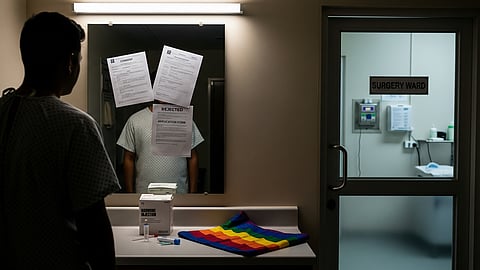For trans men in India, a doctor visit is a minefield of humiliation, denial and trauma
Follow TNM’s WhatsApp channel for news updates and story links
Selvam*, a trans man from Tamil Nadu, was 24 when he finally gathered the courage to seek surgery to remove his breasts. He had done his research, saved up, and approached a government hospital with cautious hope. But before a surgeon would even consider his case, they told him to cut his hair and wear men’s clothes. “You have to look like a man first,” one doctor told him flatly.
Every visit to the hospital became a ritual of humiliation. Each appointment left Selvam feeling less like a patient and more like a specimen: not someone seeking healthcare, but someone being tested for how convincingly he could represent masculinity. This wasn’t an isolated incident for Selvam or the other trans men who spoke to TNM.
Despite the legal recognition of transgender rights in India, trans men remain largely invisible in public discourse, policymaking, and the healthcare system. While gender-affirming care is now legally mandated under the Transgender Persons (Protection of Rights) Act, 2019, the absence of concrete protocols, informed consent frameworks, and accountability mechanisms has left trans men navigating a system that is both hostile and unprepared.
Hospitals impose arbitrary requirements – including subjecting them to invasive examinations – and disregard global medical standards prescribed by the World Professional Association for Transgender Health (WPATH). Without clear protocols, trans men are forced to navigate a system that infantilises and excludes them.
Fred Rogers, a Chennai-based man of transgender experience, has now challenged this system in the Madras High Court by filing a public interest litigation that seeks to compel the Tamil Nadu Health and Family Welfare Department to adopt technical and operational protocols for gender-affirming care in line with WPATH’s Standards of Care.
The petitioner cites 10 anonymised testimonies from transgender men who experienced serious violations, including forced nudity, invasive exams, and being denied care based on appearance. He argues that the absence of proper guidelines has resulted in widespread violations of fundamental rights, including the rights to equality, bodily autonomy, and access to healthcare, enshrined in the Constitution and the Transgender Persons Act. He also invokes the Indian Medical Council (Professional Conduct, Etiquette and Ethics) Regulations, 2002, and related Tamil Nadu regulations.
The petition seeks the court to direct the Tamil Nadu government to implement gender-affirming care protocols aligned with WPATH and declare that any practice not conforming to WPATH be deemed professional misconduct.
To understand the scope of these issues, TNM spoke to trans men across India — from metro cities like Delhi to smaller towns in Tamil Nadu. Through the lived experiences they shared, a troubling pattern emerges: trans men continue to face discrimination, gatekeeping, and invisibility not just in the healthcare system but within the larger transgender community. Their stories also reveal how deeply cisnormativity, patriarchy, and structural neglect shape their experiences as trans men.
‘Not sick enough, not male enough’
As a college student in Delhi, Gautam visited a hospital dehydrated and sick. But before a doctor asked about his symptoms, they loudly called out his dead name (name that was given to a transgender person by their family, which they no longer use after transitioning). “They questioned why my chest was flat. They made these remarks in front of everyone. I felt humiliated and left the hospital without receiving any treatment.”

